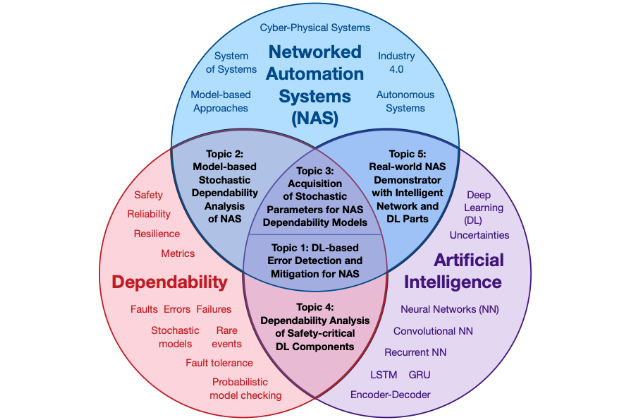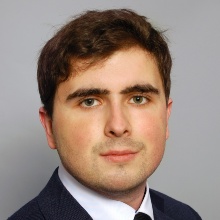Kontakt
+49 711 685 67312
+49 711 685 67302
E-Mail
Google Scholar
Pfaffenwaldring 47
70550 Stuttgart
Raum: 2.139
2024
- G. Siedel, E. Gupta, and A. Morozov, “A practical approach to evaluating the adversarial distance for machine learning classifiers.” 2024.
- P. Grimmeisen, F. Sautter, and A. Morozov, “Concept: Dynamic Risk Assessment for AI-Controlled Robotic Systems.” 2024.
- V. Naik, T. Fabarisov, and A. Morozov, “Machine Learning Based Search for Access Points in Anomaly Detection Model,” 2024.
- Y. Ma, J. Liu, I. Mamaev, and A. Morozov, “Multimodal Failure Prediction for Vision-based Manipulation Tasks with Camera Faults,” 2024 IEEE/RSJ International Conference on Intelligent Robots and Systems (IROS), pp. 2951–2957, 2024.
2023
- J. Grimstad and A. Morozov, “Adversarial Multi-Agent Reinforcement Learning for Fault-Tolerant Design of Complex Systems,” 2023, pp. 3399–3405.
- P. Grimmeisen, R. Golwalkar, Y. Ma, and A. Morozov, “Automated and Continuous Risk Assessment for ROS-Based Software-Defined Robotic Systems,” 2023, pp. 1–7.
- S. Ding, A. Wolf, and A. Morozov, “Automated and Self-Adapting Approach to AI-based Anomaly Detection,” 2023, pp. 3056–3063.
- Y. Ma, P. Grimmeisen, and A. Morozov, “Case Study: ROS-Based Fault Injection for Risk Analysis of Robotic Manipulator,” in 2023 IEEE 19th International Conference on Automation Science and Engineering (CASE), 2023, pp. 1–6.
- S. Bickelhaupt, M. Hahn, N. Nuding, A. Morozov, and M. Weyrich, “Challenges and Opportunities of Future Vehicle Diagnostics in Software-Defined Vehicles,” 2023.
- S. Bickelhaupt, M. Hahn, N. Nuding, A. Morozov, and M. Weyrich, “Comprehensive Evaluation of Logging Frameworks for Future Vehicle Diagnostics,” 2023.
- B. Schürrle, P. Grimmeisen, J. Pfeiffer, T. Zimmermann, A. Morozov, and A. Wortmann, “Educating Future Software Engineers for Industrial Robotics,” 2023.
- A. Aghaei Attar, T. Fabarisov, A. Morozov, M. Artelt, and I. Mamaev, “Hybrid Lightweight Deep Learning-Based Error Detection Model on Edge Computing Devices,” 2023, pp. 1–4.
- S. Ding, A. Wolf, and A. Morozov, “Interpretation of Influential Factors for AI-Based Anomaly Detection,” 2023, pp. 1762–1769.
- G. Siedel, S. Vock, and A. Morozov, “Investigating the Corruption Robustness of Image Classifiers with Random Lp-norm Corruptions,” May 2023.
- J. Grimstad, T. Ruppert, J. Abonyi, and A. Morozov, “Preventive Risk-based Maintenance Scheduling using Discrete-Time Markov Chain Models,” 2023, pp. 1135–1142.
- T. Fabarisov, V. Naik, A. Aghaei Attar, and A. Morozov, “Remedy: Automated Design and Deployment of Hybrid Deep Learning-based Error Detectors,” 2023, pp. 1–8.
- B. Schürrle, V. Sankarappan, and A. Morozov, “SynthiCAD: Generation of Industrial Image Data Sets for Resilience Evaluation of Safety-Critical Classifiers,” 2023, pp. 2199–2206.
2022
- P. Grimmeisen, M. Diaconeasa, Y. Ma, and A. Morozov, “Automated Generation of Hybrid Probabilistic Risk Models from SysML v2 Models of Software-Defined Manufacturing Systems,” in Morozov ASME 2022 International Mechanical Engineering Congress & Exposition (IMECE 2022), 30.Oct-3. Nov. 2022, 2022, 2022.
- P. Grimmeisen, A. Morozov, T. Fabarisov, A. Wortmann, and C. H. Koo, “Automated Model-Based Reliability Assessment of Software-Defined Manufacturing,” in 2022 IEEE 27th International Conference on Emerging Technologies and Factory Automation (ETFA), September 2022, 2022.
- P. Grimmeisen, A. Wortmann, and A. Morozov, “Case study on automated and continuous reliability assessment of software-defined manufacturing based on digital twins,” MODELS ’22: Proceedings of the 25th International Conference on Model Driven Engineering Languages and Systems: Companion Proceedings, 2022.
- Y. Ma, P. Grimmeisen, and A. Morozov, “Detection and classification of robotic manipulator anomalies using MLSTM-FCN models,” ASME 2022 International Mechanical Engineering Congress & Exposition (IMECE 2022), 30.Oct-3. Nov. 2022, 2022, 2022.
- T. Fabarisov, A. Morozov, I. Mamaev, and P. Grimmeisen, “FIDGET: Deep Learning-Based Fault Injection Framework for Safety Analysis and Intelligent Generation of Labeled Training Data,” 2022 IEEE 27th International Conference on Emerging Technologies and Factory Automation (ETFA), September 2022, 2022.
- S. Ding, N. Chakraborty, and A. Morozov, “IMU Sensor Faults Detection for UAV using Machine Learning,” in European Conference on Safety and Reliability 2022, 28 Aug - 3 Sept. 2022, Dublin, Ireland, 2022, 2022.
- S. Ding, S. Ayoub, and A. Morozov, “Tool Paper: Time Series Anomaly Detection Platform for MATLAB Simulink,” In: 8th International Symposium on Model-Based Safety Assessment, 5-7 Sept. 2022, Munich, Germany, 2022, 2022.
- G. Siedel, S. Vock, A. Morozov, and S. Voß, “Utilizing Class Separation Distance for the Evaluation of Corruption Robustness of Machine Learning Classifiers,” in The IJCAI-ECAI-22 Workshop on Artificial Intelligence Safety (AISafety), 2022, 2022.
2021
- Y. Ma, A. Morozov, and S. Ding, “Anomaly Detection for Cyber Physical Systems using Transformers,” The International Mechanical Engineering Congress and Exposition, IMECE, 2021.
- T. Fabarisov, I. Mamaev, A. Morozov, and K. Janschek, “Deep Learning-based Error Mitigation for Assistive Exoskeleton with Computational-Resource-Limited Platform and Edge Tensor Processing Unit,” in The International Mechanical Engineering Congress and Exposition, IMECE, 2021.
- S. Ding, A. Morozov, T. Fabarisov, and S. Vock, “KrakenBox: Deep Learning based Error Detector for Industrial Cyber-Physical Systems,” in The International Mechanical Engineering Congress and Exposition, IMECE, 2021.
2020
- A. Morozov, M. A. Diaconeasa, and M. Steurer, “A Hybrid Methodology For Model-based Probabilistic Resilience, Evaluation Of Dynamic Systems,” in International Mechanical Engineering Congress and Exposition (IMECE 2020 - Virtual Conference), 15-19 Nov. 2020, Portland, OR, USA, 2020.
- A. Morozov, M. B. Emil Valiev, L. G. Kai Ding, and C. Schorn, “Bayesian Model for Trustworthiness Analysis of Deep Learning Classifiers,” in Proceedings of the Workshop on Artificial Intelligence Safety 2020 co-located with the 29th International Joint Conference on Artificial Intelligence and the 17th Pacific Rim International Conference on Artificial Intelligence (IJCAI-PRICAI 2020), 2020.
- E. Valiev, N. Yusupova, A. Morozov, K. Janschek, and M. Beyer, “Evaluation of the Impact of Random Computing Hardware Faults on the Performance of Convolutional Neural Networks,” in In: Proceedings of the 8th Scientific Conference on Information Technologies for Intelligent Decision Making Support (ITIDS 2020), Atlantis Press, pp. 307-312, 2020.
- M. Moradi, B. J. Oakes, M. Saraoglu, A. Morozov, K. Janschek, and J. Denil, “Exploring Fault Parameter Space Using Reinforcement Learning-based Fault Injection,” in 50th Annual IEEE/IFIP International Conference on Dependable Systems and Networks Workshops (DSN-W - Virtual Conference), 29 June - 2 July 2020, Valencia, Spain, pp. 102-109, 2020.
- M. Beyer, A. Morozov, E. Valiev, C. Schorn, L. Gauerhof, K. Ding, and K. Janschek, “Fault Injectors for TensorFlow: Evaluation of the Impact of Random Hardware Faults on Deep CNNs,” in 30th European Safety and Reliability Conference (ESREL - Virtual Conference), 1-5 Nov. 2020, Venice, Italy, 2020.
- C. Dubslaff, A. Morozov, C. Baier, and K. Janschek, “Iterative Variable Reordering: Taming Huge System Families,” Proceedings of the 4th Workshop on Models for Formal Analysis of Real Systems (MARS 2020), pp. 121-133, 2020.
- T. Mutzke, M. Steurer, A. Morozov, and K. Janschek, “Model-based Analysis of Timing Errors for Reliable UAV Design,” in 30th European Safety and Reliability Conference (ESREL - Virtual Conference), 1-5 Nov. 2020, Venice, Italy, pp. 2057-2064, 2020.
- M. Steurer, A. Morozov, K. Janschek, and K.-P. Neitzke, “Model-Based Dependability Assessment of Phased-Mission Unmanned Aerial Vehicles,” in 21st IFAC World Congress (Virtual Conference), 11-17 July 2020, Berlin, 2020.
- S. Ding, A. Morozov, S. Vock, M. Weyrich, and K. Janschek, “Model-Based Error Detection for Industrial Automation Systems Using LSTM Networks,” In: International Symposium on Model-Based Safety and Assessment, pp. 212-226. Springer, Cham, 2020.
- A. M. T. Fabarisov, I. Mamaev and K. Janschek, “Model-based Fault Injection Experiments for the Safety Analysis of Exoskeleton System,” in 30th European Safety and Reliability Conference (ESREL - Virtual Conference), 1-5 Nov. 2020, Venice, Italy, 2020.
- T. Fabarisov, N. Yusupova, K. Ding, A. Morozov, and K. Janschek, “Model-based Stochastic Error Propagation Analysis for Cyber-Physical Systems,” Acta Polytechnica Hungarica, 17(8), pp.15-28, 2020.
- C. Dubslaff, A. Morozov, C. Baier, and K. Janschek, “Reduction Methods on Probabilistic Control-flow Programs for Reliability Analysis,” in 30th European Safety and Reliability Conference (ESREL - Virtual Conference), 1-5 Nov. 2020, Venice, Italy, pp. 4843-4850, 2020.
- M. Steurer, T. Mutzke, A. Morozov, K. Janschek, and K.-P. Neitzke, “Utilizing Model-based Timing Analysis for Holistic Dependability Assessment of Unmanned Aerial Vehicle,” in 30th European Safety and Reliability Conference (ESREL - Virtual Conference), 1-5 Nov. 2020, Venice, Italy, pp. 2065-2072, 2020.
- M. Saraoğlu, Q. Shi, A. Morozov, and K. Janschek, “Virtual validation of autonomous vehicle safety through simulation-based testing,” In 20. In: Internationales Stuttgarter Symposium, pp. 419-434, Springer Vieweg, Wiesbaden, 2020.
2019
- T. Fabarisov, N. Yusupova, K. Ding, A. Morozov, and K. Janschek, “Analytical toolset for model-based stochastic error propagation analysis: extension and optimization towards industrial requirements,” Системная инженерия и информационные технологии, 1(1), pp.41-46, 2019.
- K. Ding, S. Ding, A. Morozov, T. Fabarisov, and K. Janschek, “On-line error detection and mitigation for time-series data of cyber-physical systems using deep learning based methods,” in 2019 15th European Dependable Computing Conference (EDCC) (pp. 7-14). IEEE, 2019.
2018
- T. Fabarisov, N. Yusupova, K. Ding, A. Morozov, and K. Janschek, “The efficiency comparison of the prism and storm probabilistic model checkers for error propagation analysis tasks,” Industry 4.0, 3(5), pp.229-231., 2018.
Das Forschungsinteresse von Jun.-Prof. Morozov liegt an der Schnittstelle von drei Domänen, nämlich (i) vernetzte Automatisierungssysteme (VAS), (ii) Zuverlässigkeit und (iii) künstliche Intelligenz (KI). Das moderne VAS ist ein besonderer Fall von Cyber-Physischen Systemen (CPS) mit dem Schwerpunkt auf der Zusammenarbeit heterogener Industrierobotersysteme. Eine genaue Bewertung der Zuverlässigkeit, Sicherheit und Ausfallsicherheit ist für VAS aufgrund der hohen Kosten für Ausfallzeiten und der strengen Sicherheitsanforderungen von entscheidender Bedeutung. Die analytischen Fähigkeiten von Methoden zur Bewertung der Zuverlässigkeit, die derzeit in der Industrie angewendet werden, liegen jedoch weit hinter dem technischen Niveau der betreffenden Systeme zurück. Diese Methoden können anspruchsvolle Fehlerszenarien eines hochdynamischen und intelligenten VAS nicht angemessen beschreiben. Außerdem wird das zukünftige VAS immer mehr KI-Komponenten enthalten. Die Zuverlässigkeits- und Sicherheitsanalyse der KI ist derzeit jedoch eine völlig offene Frage. Eine unvermeidliche Revolution der Zuverlässigkeitsmethoden wird in den nächsten Jahren erwartet. Das Hauptziel ist es daher, ein starkes Forschungsteam aufzubauen, das eine führende Rolle bei der Entwicklung der nächsten Generation von Methoden zur Zuverlässigkeitsanalyse für moderne und zukünftige VAS übernehmen kann.

Jun.-Prof. Morozov übernimmt ab dem Wintersemester 2020-2021 den Kurs " Technologien und Methoden der Softwaresysteme I " für Bachelor-Studierende. Daneben erstellt er einen neuen 4SWS-Kurs "Modeling and Analysis of Automation Systems (MAAS)" für Masterstudenten der Studiengänge “Autonome Systeme”, “Elektrotechnik und Informationstechnologie” sowie “Electrical Engineering”.
Jun.-Prof. Andrey Morozov hat im April 2020 am IAS angefangen. Er hat eine sechsjährige Tenure-Track-Stelle inne. In dieser Zeit muss er eine neue Professur für "Vernetzte Automatisierungssysteme" einrichten und die vom Rektorat festgelegten Forschungs- und Lehrziele erreichen.
Jun.-Prof. Morozov erhielt 2007 sein Diplom in Informatik und Mathematik von der Ufa State Aviation Technical University in Ufa, Russland. 2009 zog er nach Deutschland und hat seine Promotion am Institut für Automatisierung (IfA) der Fakultät für Elektrotechnik und Informationstechnik der Technischen Universität Dresden im Jahre 2012 abgeschlossen. Danach arbeitete er als Postdoc-Forscher an mehreren F & E-Projekten, die von DLR, ESA, NASA und DFG finanziert wurden. Im Jahr 2014 gründete Jun.-Prof. Morozov am IfA eine neue Forschungsgruppe auf, deren Schwerpunkt auf der modellbasierten Analyse sicherheitskritischer mechatronischer Systeme liegt. Jun.-Prof. Morozov hat 40 veröffentlichte wissenschaftliche Papers und mehr als 20 wissenschaftliche Vorträge gehalten, darunter Präsentationen in Forschungszentren der ESA, des DLR, von Bosch, MathWorks, des Sandford Research Institute und der University of California in Los Angeles.
-


































